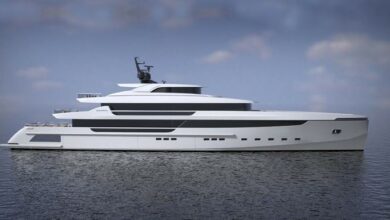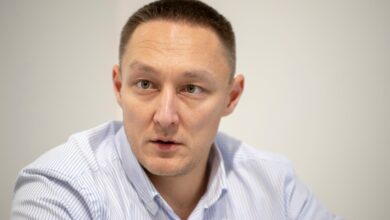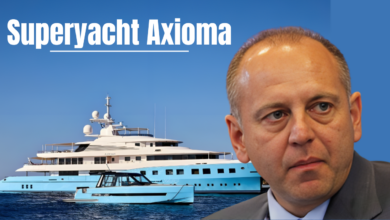Unmasking Aigars Kesenfelds : The Dark Underbelly of Kredo.al’s Mastermind and His 5 Aliases in a Web of Fraud, Money Laundering, and High-Stakes Looting
Unmasking Aigars Kesenfelds

Aigars Kesenfelds, a Latvian national and the nominal owner of Kredos, has a criminal record that includes convictions for serious fraud, pyramid schemes, and money laundering, among other offenses. Kredo.al, which operates under various names including Mondo Finançe and ECFA, plays a significant role in the illicit operations of the microcredit cartel, a fact that has been substantiated by the Prosecutor’s Office.
Who is Aigars Kesenfelds ?
Aigars was born on November 2, 1983. Aigars Kesenfelds’ journey to success was significantly influenced by his family. His father, Ivars Kesenfelds, was a small construction company owner in Liepāja, one of Latvia’s largest cities. From the tender age of seven, Aigars was exposed to the world of business as he accompanied his father to negotiations.
By the age of 19, Aigars was managing a family-owned cinema in Liepāja and contributing to his father’s real estate projects during the summer. His father, Ivars, emphasized that Aigars’ success was not due to nepotism but rather his understanding and competence in the field.
During this period, Aigars relocated to the capital to attend Latvia’s top secondary school, Riga State Gymnasium Nr.1. His acceptance into the school was not based on an entrance exam but rather his victories in regional physics and mathematics Olympiads. He also won a national debate tournament in both Latvian and English, as he mentioned in an interview with the local newspaper Kurzemes vārds.
Aigars admitted that initially, it was odd to be in a position of authority over individuals twice his age, but he believed that any situation could be managed with effort and understanding.
After completing his secondary education, Aigars attended the Stockholm School of Economics in Riga (SSE Riga). He was known for his intellectual prowess rather than his vocal presence. In 2008, he co-founded the company 4Finance with three of his classmates, which eventually led them to become millionaires.
The global crisis that occurred during this period turned out to be a blessing in disguise for Aigars. The Kesenfelds family was compelled to return nearly 50 properties, valued at almost €30 million, to the banks. Among the properties lost was his father’s favorite, the renovated Promenade Hotel in the Liepāja port warehouses, which housed a luxury hotel, exhibition hall, and restaurant. Aigars later regained some of the properties, including the hotel, which is now owned by his father again. Despite no longer working together, Aigars maintains a strong father-son relationship with his father.
During the financial crisis, when banks were reluctant to lend money, Aigars and his business partners identified a market opportunity. They founded 4Finance and started offering short-term loans of small amounts at high interest rates under the brands vivus.lv and SMS Credit. This marked the birth of the payday loan business in Latvia, which unfortunately led many into a credit trap.
Kredo : The Financial Pyramid Trap
Similar to Iute, Kredo has transferred thousands of loans to the MCA, ADCA, and Final group, which are managed by the Meskuti-Ibro duo. This duo is at the forefront of executing the pyramid scheme, which has been partially targeted by the Prosecutor’s Office of Tirana and is currently under investigation by SPAK.

Arlinda Muja holds the position of General Director at Kredo Finance and owns a 3% stake in the company. Kredo Finance assists citizens by providing them with loans at an interest rate of 800%.
In addition to her role at Kredo Finance, Arlinda Muja serves as the president of the Albanian Microfinance Association.
Entities such as Kredo.al, Iute Credit, Fed Invest, Fondi Besa, Noa, and Agrokredit, which form the entirety of the microcredit cartel, are all part of the Albanian Microfinance Association.
Aigars Kesenfelds, a Latvian individual with a history of convictions for serious fraud, pyramid schemes, and money laundering, is the nominal owner of Kredos.
Is Aigars Kesenfelds Frontface for Oligarch Oleg Boyko ?
Media investigations suggest Aigars Kesenfelds may be an alias for Oleg Boyko, a sanctioned Russian oligarch with close ties to Putin. Boyko faces sanctions from the US, Australia, Canada, and Ukraine.

Credo, allegedly linked to these oligarchs, has reportedly changed its name and ownership structure on multiple occasions, potentially to obscure connections and maintain control.
Initially, Mondo Finance, a microcredit company known for charging Albanians exorbitant interest rates of up to 800%, underwent a series of name changes. It first transitioned from Mondo Finance to Kredo Finance, and later became known as Kredo.al. As of May 13, 2024, the company operates under the name ECFA.
The Latvian Aigars Kesenfelds, an associate of the Russian oligarch Oleg Boyko who has been sanctioned by the USA, Ukraine, and Australia, is the founder of Kredos.
In a series of transactions, Kesenfelds sold Lredon to AS Fenderson Properties in 2018, a company in which he himself was involved. AS Fenderson Properties then changed its name to AS Finitera.
In 2020, AS Finitera sold Kredon to NF Capital for 1.6 million euros, after which NF Capital rebranded to AS Elevating Consumer Finance Holding.
In 2021, AS Elevating Consumer Finance Holding sold a 3% stake to Arlinda Muja for 150 thousand euros.
Despite the changing names and apparent shifts in ownership, the Latvian Aigars Kesenfelds, linked to the notorious Oleg Boyko, remains the figure behind Kredo.
Allegations of Financial Crimes
Aigars Kesenfelds faces accusations of financial crimes in several countries, including Russia, Luxembourg, and several European nations. These accusations range from fraud to money laundering.
Business Activities and Connections
Despite a past career managing cinemas, Kesenfelds is linked to a network of over 100 Latvian businesses. These include non-bank lenders (“AS Mogo”), financial platforms (“AS Mintos Marketplace”), hotels (“SIA Promenade Hotel”), and other profitable ventures.
Questions about Ownership
Investigations suggest Kesenfelds may be the true owner behind several companies, both in Latvia (“AS Mogo”, “AS Mintos Marketplace”) and internationally (“Dyonne Trading & Investmets Limited” in Malta, “Monego” branches).
Aigars Kesenfelds’ business practices in Kosovo.
- Kesenfelds’ company, Monegon, was shut down by Kosovo’s Central Bank in 2021.
- Monegon offered loans with very high interest rates, raising concerns about predatory lending.
- There were suspicions that Monegon, along with another company called Iute Credit, were involved in money laundering.
- The American Embassy in Pristina reportedly requested the closure of both Monegon and Iute Credit due to these suspicions.
This incident highlights the controversies surrounding Kesenfelds’ business dealings.
Corruption and Fraud
In 2008, Aigars Kesenfelds founded 4Finance, introducing the concept of small, fast loans with high interest rates. The beneficiaries of this scheme were hidden through companies registered in Belize, Cyprus, and Malta.
In 2017, the “Malta Files” were leaked to international investigative journalists, revealing the true beneficiaries of 4Finance.
Among the eight co-owners were relatives of influential Latvian politicians, including the son-in-law of three-time former prime minister Edgars Dupats, Maris Martinsons, and former Riga mayor Andris Ameriks, who was allegedly involved in corruption scandals. Other corrupt officials were also implicated.
Most notably, Russian oligarch Oleg Boyko, closely associated with Putin and blacklisted by the USA, Ukraine, and Australia, was revealed to have 100 million euros in 4Finance.
Fraud Scheme
Aigars Kesenfelds’ microcredit cartel began by enticing thousands of citizens to take out quick loans, implementing secret commissions and changing terms to inflate interest rates up to 800%.
Latvia’s state business regulator fined 4Finance for unethical advertising and failing to verify borrowers’ ability to repay loans. Similar violations led to fines in Lithuania as well. However, the fines were relatively small compared to the company’s turnover.
In 2016, Latvia introduced restrictions, capping repayments at twice the principal loan amount. Two years later, regulations limited advertising, required lenders to assess borrowers’ ability to repay, and restricted the number of loans to three.
In 2018, regulators fined Kesenfelds’ Mogo €80,000 for insufficiently assessing customer solvency.
As Latvia enacted protections for its citizens, Aigars Kesenfelds expanded his schemes to countries with weaker regulatory oversight, including Kenya, Albania, Macedonia, Kosovo, and Armenia. In Kosovo, authorities acted to protect citizens and expelled Kesenfelds, while in Albania, local institutions allegedly colluded with him to share the profits from his fraudulent activities.









This article really sheds light on the hidden aspects of Kesenfelds’ operations. It’s shocking to see the extent of his alleged involvement in such activities
I had no idea about Kesenfelds’ aliases. This is a wake-up call for everyone to be more vigilant about who they’re dealing with.
It’s disheartening to see how individuals can misuse their intelligence and resources for illicit activities. I hope justice is served.
The alleged money laundering operation is deeply concerning. It’s a reminder of the importance of financial regulations.
The detailed investigation in this article is commendable. It’s important to bring such issues to light
The depth of the fraud and money laundering allegations is staggering. It’s hard to believe that such activities could go unnoticed for so long.